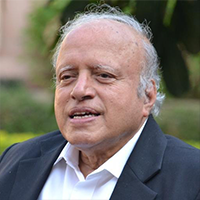M. S. Swaminathan
Mankombu Sambasivan Swaminathan is an Indian geneticist and administrator, known for his role in India’s Green Revolution. Swaminathan has been called the “Father of Green Revolution in India” for his role in introducing and further developing high-yielding varieties of wheat in India.
Professor M S Swaminathan has been acclaimed by the TIME magazine as one of the twenty most influential Asians of the 20th century and one of the only three from India, the other two being Mahatma Gandhi and Rabindranath Tagore. He has been described by the United Nations Environment Programme as “the Father of Economic Ecology” because of his leadership of the ever-green revolution movement in agriculture and by Javier Perez de Cuellar, Secretary General of the United Nations, as “a living legend who will go into the annals of history as a world scientist of rare distinction”. He was Chairman of the UN Science Advisory Committee set up in 1980 to take follow-up action on the Vienna Plan of Action. He served as Director of the Indian Agricultural Research Institute (1961-72), Director General of Indian Council of Agricultural Research and Secretary to the Government of India, Department of Agricultural Research and Education (1972-79), Principal Secretary, Ministry of Agriculture (1979-80), Acting Deputy Chairman and later Member (Science and Agriculture), Planning Commission (1980-82) and Director General, International Rice Research Institute, the Philippines (1982-88). A plant geneticist by training, Professor Swaminathan’s contributions to the agricultural renaissance of India have led to his being widely referred to as the scientific leader of the green revolution movement. His advocacy of sustainable agriculture leading to an ever-green revolution makes him an acknowledged world leader in the field of sustainable food security. The International Association of Women and Development conferred on him the first international award for significant contributions to promoting the knowledge, skill, and technological empowerment of women in agriculture and for his pioneering role in mainstreaming gender considerations in agriculture and rural development. Professor Swaminathan was awarded the Ramon Magsaysay Award for Community Leadership in 1971, the Albert Einstein World Science Award in 1986, the first World Food Prize in 1987, and Volvo, Tyler and UNEP Sasakawa Prize for Environment, the Indira Gandhi Prize for Peace, Disarmament and Development in 2000 and the Franklin D Roosevelt Four Freedoms Medal, the Mahatma Gandhi Prize of UNESCO in 2000 and the Lal Bahadur Sastri National Award (2007). He is the recipient of Padma Shri (1967), Padma Bhushan (1972) and Padma Vibushan (1989).
M. S. Swaminathan was born in Kumbakonam, Tamilnadu, India on 7 August 1925. He was the second son of surgeon Dr. M.K. Sambasivan and Parvati Thangammal Sambasivan. After his father’s death when he was 11, young Swaminathan was looked after by his uncle. He attended the local high school and later the Catholic Little Flower High School in Kumbakonam, from which he matriculated at age 15.[3] Coming from a family of doctors, he took admission in a medical school. But, when he witnessed the Great Bengal famine of 1943, he decided to devote his life to getting rid of hunger from India. He was influenced by Mahatma Gandhi while he took this decision. He switched from the medical field to the agricultural field.[4] He then went on to finish his undergraduate degree in Biology at Maharaja’s College in Trivandrum, Kerala (now known as University College, Thiruvananthapuram). He studied there from 1940–44 and earned a Bachelor of Science degree in zoology.
Later Swaminathan decided to pursue a career in agricultural sciences and enrolled in Madras Agricultural College (now the Tamil Nadu Agricultural University) where he graduated as valedictorian with another Bachelor of Science degree, this time in Agricultural Science.
In 1947, the year of Indian independence he moved to the Indian Agricultural Research Institute (IARI) in New Delhi as a post-graduate student in genetics and plant breeding. He obtained a post-graduate degree with high distinction in Cytogenetics in 1949.Dr Swaminathan is a prolific scientific researcher and writer. He published 46 single-author papers between 1950 and 1980. Out of 118 two author papers, he was first author of 80. Out of 63 three-author papers he was first author of 15. Out of 21 four-author papers he was first author of 9. In total he had 254 papers to his credit, 155 of which he was the single or first author. His scientific papers are in the fields of crop improvement (95), cytogenetics and genetics (87) and phylogenetics (72). His most frequent publishers were Indian Journal of Genetics (46), Current Science (36), Nature (12) and Radiation Botany

M. S. Swaminathan
Date of Birth: 07 Aug 1925
Birth Place: Kumbakonam
Proffession: Indian geneticist
Nationality: Indian


